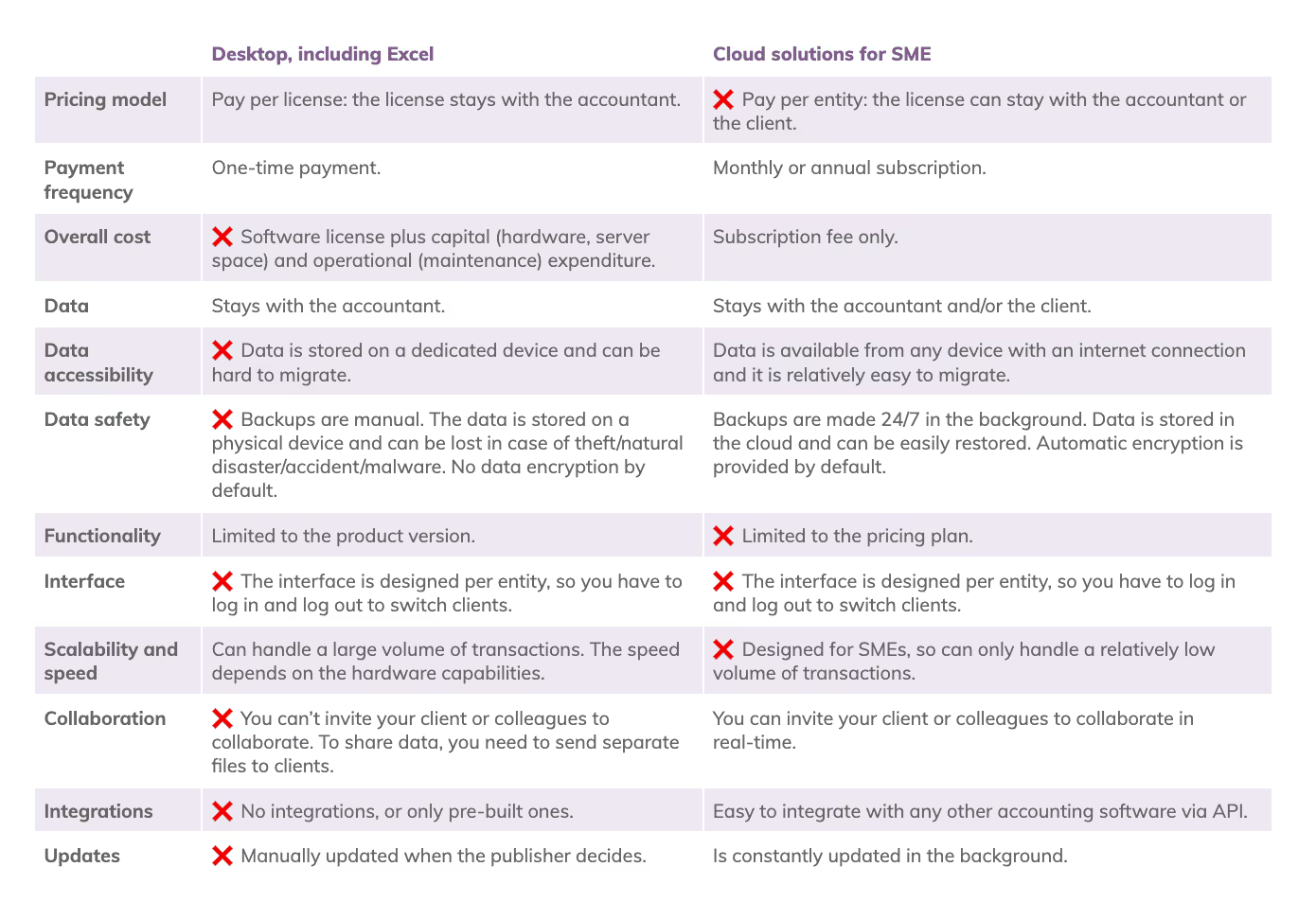3 Benefits of Multi-Company Accounting Software
Unlock the perks of multi-entity accounting solutions that allow you to automate a bunch of micro and small clients while still staying profitable.
Planning to revamp your accounting firm's tech stack? Let's compare cloud vs desktop solutions, so you can choose the best tool and upgrade your practice.
.avif)
As a professional accountant, how do you make the right choice between cloud accounting software vs desktop solutions? In this article, we’ll help you choose the best software to provide exceptional service and scale your practice.
In this article
Cloud accounting solutions are booming, and it’s no surprise. With cloud apps, companies of all sizes can keep their finances organized without purchasing and maintaining expensive IT systems. When it comes to SMEs, smart cloud solutions are already taking over the work of professional accountants and accounting firms, since the apps are so easy to use that sooner or later some clients learn to do the books on their own.
Cloud software (also known as online, web, cloud-based, serverless, on-demand, or off-premises software) refers to applications that are available in the cloud—in other words, on third-party servers that you access through an internet connection.
Compared to on-premise desktop solutions like Excel, cloud apps are not stored on your computer or your company’s servers. Instead, you can access them from any device via an internet browser.
Some examples of popular cloud-based software are Google Drive, Salesforce, Zoom, and Asana. In the accounting software ecosystem, there are cloud apps for general accounting, payroll, invoicing, inventory, and document management. Some of these apps (such as Quickbooks) have both desktop and cloud versions, while others are cloud-first or cloud-only (Eleven, Xero).
.avif)
Thanks to changes in business practices, the rise of remote working, and the need for operational agility during the pandemic, cloud apps and cloud providers like Amazon AWS and Microsoft are growing amidst the crisis.
However, research from Synergy Research Group and PwC shows that companies were favoring cloud over desktop software long before COVID-19. The reason? Cloud-based and pay-as-you-go solutions offer a transition to a more flexible variable-cost model, allowing organizations to move expensive computing assets from capex to opex.
For instance, if we look at technology adoption among accounting firms in a booming business hub like Singapore, cloud solutions have seen rapid and steady growth over the years:
.avif)
What’s more, the trend is picking up: 75% of US finance leaders say they are looking forward to investing more in an agile business environment, and 66% of them are looking to the cloud for growth and innovation.
It’s no wonder, then, that if you Google the best accounting solutions for 2022, cloud-based software comes out on top. After starting out as a smart cost-saving solution for small businesses, it’s now a true game changer for companies of any size.
However, as always, there are pros and cons to bear in mind, especially if you’re a professional accountant working with multiple clients. Let’s compare cloud apps with their desktop alternatives, so you can see which solution fits your clients and tasks best.
Here’s a detailed comparison based on 12 parameters that are important for accounting professionals who work on their own or contribute to small and medium-sized accounting firms.

It turns out that although cloud apps are more flexible and affordable, they’re ultimately designed for your clients and don’t take into account your needs as a professional accountant or accounting firm. This is why you’re probably familiar with having to juggle several accounting apps in order to stay client-oriented in your practice, and falling back on Excel to fill in the gaps.
Let’s imagine an ideal app for a professional accountant doing the books for 20 or more SMEs on a monthly and yearly basis. Getting back to our comparison, this app should combine the advantages of both desktop and cloud solutions. In other words, it should:
With these things in mind, we created Eleven: a cloud-based accounting automation platform for professional accountants and accounting firms. With Eleven, you can enjoy all the benefits of cloud and desktop accounting apps in one solution—and even more.

What’s more, with Eleven’s additional BI and reporting capabilities, you can create custom reports and distill valuable insights for your clients’ business innovation, improvement, and sustainability. We believe that there’s huge power in numbers, and the future of accounting is not about replacing people with DIY software but about turning them into strategic finance business partners.
In 2023, the choice between cloud accounting software vs desktop solutions seems clear. Cloud-based software definitely has the edge over desktop solutions when it comes to features, usability, and cost. However, most cloud solutions are designed for end clients, not for the needs of accountants who actually do the books.